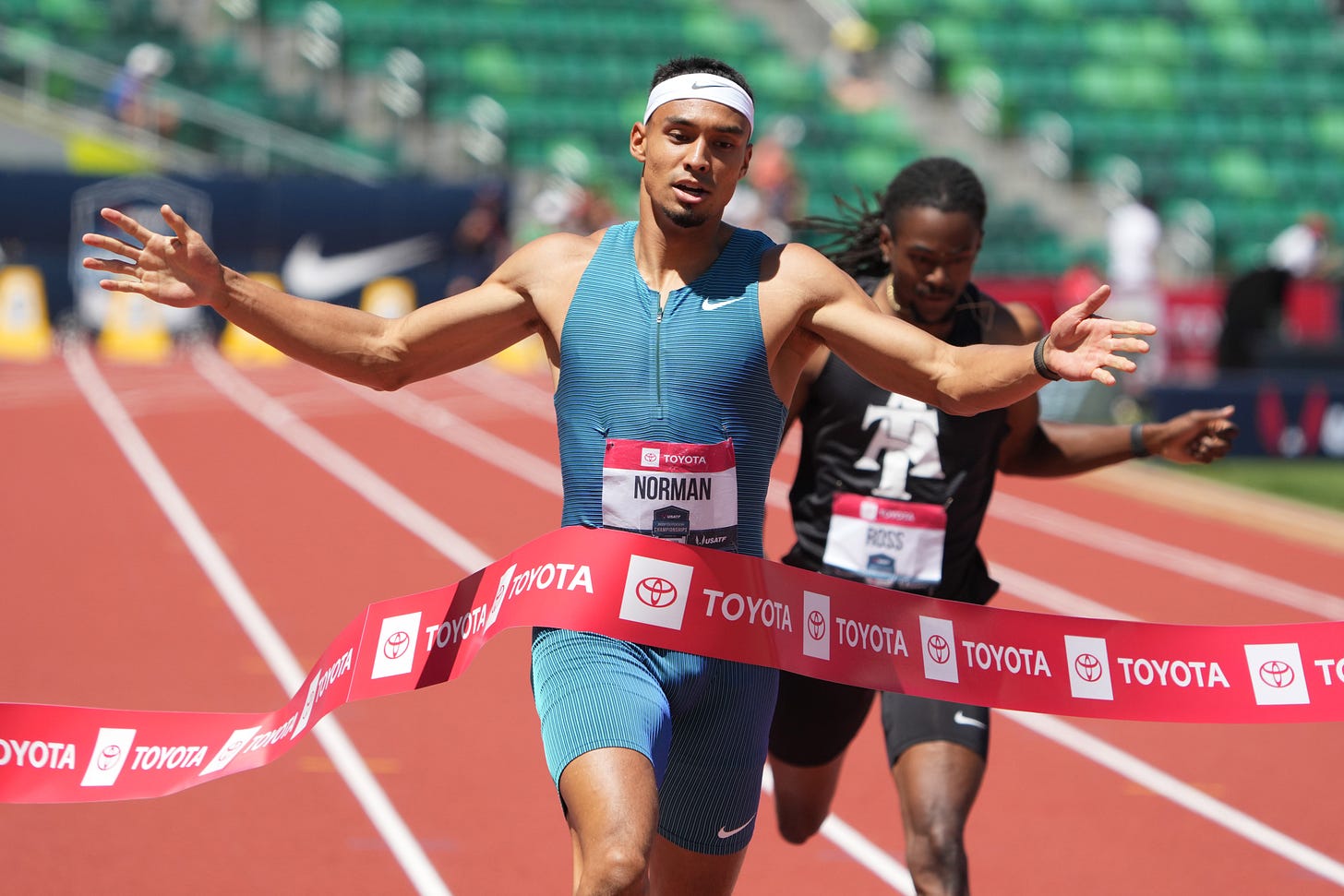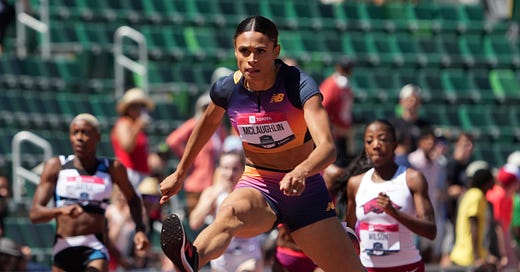McLaughlin on a world-record roll
Hurdler lowers world best for third time in 12 months, Felix falls short in 400

On an afternoon when Allyson Felix finished sixth in the final national championship race of her illustrious career, Sydney McLaughlin set her third world record in the last 12 months in the women’s 400-meter hurdles in the USA Track & Field Outdoor Championships at the University of Oregon’s Hayward Field on Saturday.
Running on the same track that will host the World Championships from July 15-24, the 22-year-old McLaughlin ran 51.41 seconds to trim five hundredths of a second from the 51.46 clocking she produced in winning the Olympic Games in Tokyo last summer.
That effort had come five and a half weeks after she had run a then-world record of 51.90 to win the U.S. Olympic Trials, which were also held at Hayward Field.
When Lewis Johnson of NBC Sports asked McLaughlin what she was thinking about as she got in the blocks, she said, “Just doing what my coach told me, getting out, running a full race and giving all the glory to God.”
McLaughlin, who is the first athlete to lower the world record in the women’s 400 hurdles three times, chased down fellow American Dalilah Muhammad in the home straightaway in her two previous world records. But she led Saturday’s race from start to finish.
Running in lane five, McLaughlin made up the stagger on NCAA champion Britton Wilson of the University of Arkansas after the first two flights of hurdles of the 10-hurdle race and kept pushing the pace. She had a lead of about 10 meters on second-place Wilson when she turned into the home straightaway and had more than doubled her advantage when she crossed the finish line.
Wilson ran 53.08 to crush her previous best of 53.75 she set in winning the Southeastern Conference Championships in May and Shamier Little finished third in 53.92.
Wilson’s time made her the second fastest performer in the world this year and Little became the fourth fastest with her effort.
Muhammad, who set a then-world record of 52.16 to edge McLaughlin in the 2019 World Championships in Doha, Qatar, chose not to run in the national championships because her world title gave her an automatic berth in the upcoming global championship meet.
“I was just going to finish the race, but knew anything was possible,” McLaughlin said when asked if she was shooting for a world record. “I’m just really grateful for it.”
Grateful is a word that the 36-year-old Felix uses often when talking about a track and field career that began in 2000 when she was a freshman at what was then called L.A. Baptist High School in the San Fernando Valley in Southern California.
The bronze medalist in the 400 in the Olympics last summer had set a world junior (age 19 and under) record of 22.11 in the 200 by the time she graduated from high school in 2003 and she qualified for the first of nine World Championship teams later that summer when she finished third in the USATF Championships in the women’s 200.
Although she was eliminated in the quarterfinals of the World Championships in Paris that year, she won an unprecedented 16 medals – including 11 gold – in the eight World Championship meets since.
The five-time Olympian has won 11 medals in the Olympics, including seven gold medals. That total ranks second only to the 12 medals – including nine gold – won by Paavo Nurmi, the “Flying Finn” who ran in various distance races while competing in the Games of 1920, ’24, and ’28.
Felix had had to come from behind in a semifinal of the women’s 400 on Friday to advance to the final of the event.
When the race was run on Saturday, Felix appeared to push the pace more than she typically does for the first half of the race, and possibly because of that, she lacked her usual strong finish. She placed sixth in 51.24, more than a second behind winner Talitha Diggs (50.22) of the University of Florida.
Diggs, the daughter of four-time U.S. Olympian Joetta Clark Diggs, had used a strong finish to win the NCAA title on June 11. She employed the same tactic Saturday as she was in third place entering the home straightaway but passed race leader Kendall Ellis 20 meters before the finish.
Ellis finished second in a season best of 50.35 and Lynna Irby placed third in a season best of 50.67.
Although Felix could conceivably be named to a relay pool for the U.S. women’s or mixed 1,600 relay teams for the World Championships, her days of running in an individual event in a global title meet appear to have come to a close.
The women’s 400 was run the race before the men’s 400, the most talent-laden event of the day.
Michael Norman won the event as expected and his time of 43.56 was the fastest in the world this year, the second fastest of his career, and the 13th fastest in history. But it was a trio of collegians behind him who helped put an exclamation point on the depth of young talent in the U.S. as Champion Allison of Florida finished second in 43.70, followed by Randolph Ross of North Carolina A&T in 44.17 and Elija Godwin of Georgia in 44.34.
Ross had run 44.13 to win his second consecutive NCAA title on June 10 ahead of runner-up Allison (44.41) and third-place Godwin (44.50). But Allison’s performance Saturday cut nearly sixth tenths of a second off his previous best of 44.29 set in a semifinal of the NCAA meet and moved him to 10th on the all-time world performer list.

The women’s 100-meter hurdles was also loaded with talent as Olympic silver medalist Keni Harrison posted a yearly world-leading time of 12.34 seconds to turn back the personal bests of second-place Alaysha Johnson (12.35) and third-place Alia Armstrong of LSU (12.47).
Harrison had a clear lead over the field after the sixth of 10 hurdles, but Johnson began to eat into her lead at the seventh barrier and just missed catching her at the finish line.
There were seven other finals on Saturday.
Hilary Bor won the men’s 3,000-meter steeplechase in 8 minutes 15.76 seconds, followed by Evan Jager in 8:17.29 and Benard Keter in 8:19.16.
The women’s and men’s 1,500-meter races both began with slow first laps, but while the pace picked up noticeably on second lap of women’s race, it dawdled much longer in the men’s event.
Sinclaire Johnson won the women’s 1,500 in 4:03.29, with Cory McGee second in 4:04.52 and Elle St. Pierre third in 4:05.14.
Cooper Teare went from fourth place to first in the final straightaway to win the men’s 1,500 in 3:45.86. He was followed by Jonathan Davis of the University of Illinois in 3:46.01 and Josh Thompson in 3:46.07.
Olympic silver medalist Chris Nilsen cleared 5.70 meters (18 feet 8¼ inches) to win the men’s pole vault. Luke Winder also cleared 5.70, but he finished second because it took him three attempts to make that height while Nilsen needed only one.
Andrew Irwin finished third at 5.60 (18-4½) after winning a jump-off with Jacob Wooten.
Daniel Haugh won the men’s hammer throw with a personal best of 80.18 (263-1), followed by U.S. record-holder Rudy Winkler at 78.33 (257-0) and Alex Young at 76.60 (251-4).
Kenturah Orji set a meet record of 14.79 (48-6¼) in the women’s triple jump, followed by Tori Franklin at 14.59 (47-10½) and NCAA champion Jasmine Moore of the University of Florida at 14.15 (46-5¼). Moore finished second in the long jump on Thursday.
Kara Winger won the women’s javelin throw with a season best of 64.26 (210-10), with Ariana Ince second at 60.43 (198-3) and Avione Allgood-Whetstone third at 59.26 (194-5).
Maggie Malone, the U.S. record-holder at 67.40 (221-1), failed to record a mark as she fouled on all three of her throws.

In the semifinals of the men’s 400 intermediate hurdles, Rai Benjamin posted the fastest time as the Olympic silver medalist and second-fastest performer in history ran 47.93. Khalifah Rosser and Trevor Bassitt were the No. 2 and 3 qualifiers with times of 48.34 and 48.38.
All of the top contenders in the men’s 200 advanced to the semifinals on Sunday.
Noah Lyles, the defending World champion in the men’s 200 and the bronze medalist in the Olympics, posted the fastest first-round time with a 19.95 clocking in his heat.
Recent high school graduate Erriyon Knighton, who ran a scintillating world-leading time of 19.49 earlier this year, ran 20.08.
Olympic silver medalist Kenny Bednarek won his heat in 20.10, and Christian Coleman and Fred Kerley, fresh off his victory in the 100 on Friday, clocked 20.13 and 20.29 to finish 1-2 in their heat.
Collegiate record holder Abby Steiner of Kentucky posted the fastest time during the first-round heats of the women’s 200 when she ran 22.14.
Other heat winners were Tamara Clark (22.29), Olympic bronze medalist Gabby Thomas (22.59), and Jenna Prandini (22.65).
Sha’Carri Richardson, who failed to advance out of the first round of the 100 on Thursday, placed second behind Thomas in 22.69.
There were no surprises in the first-round heats of the men’s 110-meter high hurdles as Grant Holloway (13.11), Trey Cunningham (13.13) and Devon Allen (13.27) had the three fastest qualifying times.
Holloway is the defending World champion and Olympic silver medalist, and Cunningham capped his collegiate career at Florida State with a victory in the NCAA Championships on June 10.
Allen, a two-time Olympian who has signed a free-agent contract with the NFL’s Philadelphia Eagles, recorded the fourth-fastest time in history on June 12 when he ran 12.84 in the NYC Grand Prix.



